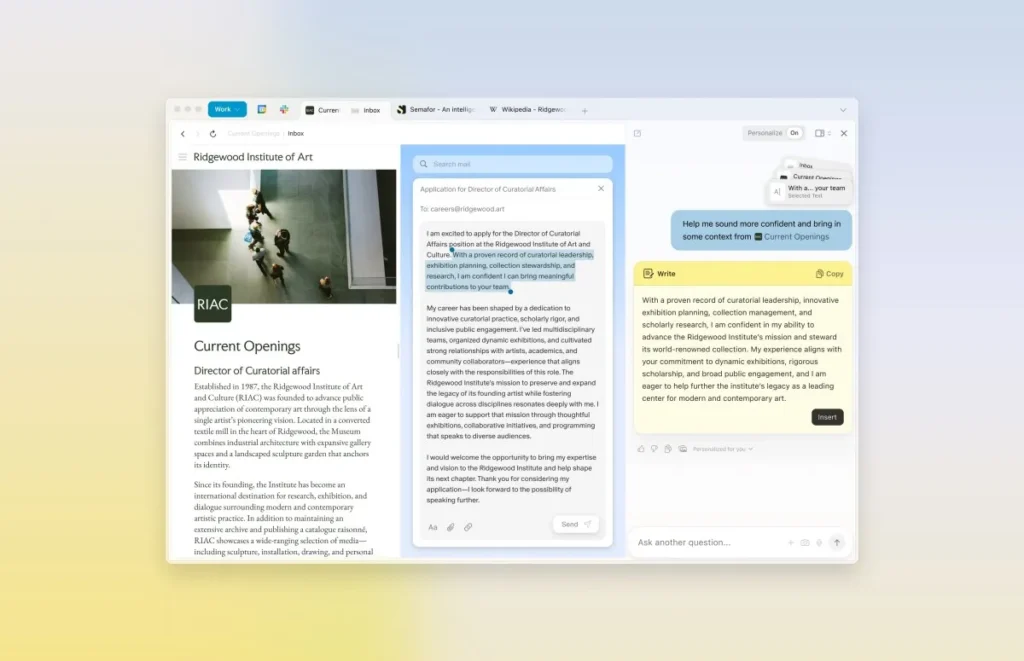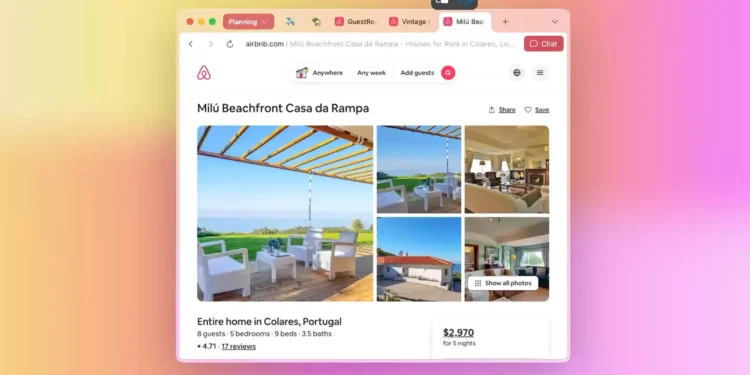Okay, so picture this: You’re writing an email about planning a team dinner, and you need to check everyone’s dietary restrictions from that Notion doc your coworker sent last week. But wait, what was it called again? And didn’t someone mention their preferences in Slack too?
This is where things get interesting.
Why Your Browser Needs a Brain Upgrade
The Browser Company just launched something that might change how we think about web browsers. It’s called Dia, and it’s not trying to be just another browser with AI slapped on top. Instead, they’re asking a pretty fascinating question: What if your browser actually understood what you’re trying to do?
Here’s what makes this particularly cool: The company behind Dia previously created Arc, a browser that tech enthusiasts absolutely loved. But Arc had a problem. It was like that sophisticated coffee machine with 47 buttons. Amazing if you knew how to use it, terrible if you just wanted coffee.
So they did something brave. They stopped developing Arc and started over.
The Magic Trick That Actually Works
Dia does something I’ve been waiting for browsers to figure out. When you’re working, it watches what you’re doing (locally on your computer, which is important for privacy). Not in a creepy way, but in a “helpful assistant who actually pays attention” way.
Let me give you a real example. Say you’re planning that team dinner I mentioned. You can literally ask Dia: “What was that doc about dietary restrictions that Sarah sent?” And it finds it. Not because you tagged it perfectly or saved it in the right folder, but because it remembers your browsing context.
But here’s where it gets really interesting. You can then tell it to email everyone on that list, and it will actually draft the emails based on how you usually write. It’s like having a really smart intern who’s been studying your communication style.
The Features That Matter
The browser is built on Chromium, so it feels familiar. That’s smart. They learned from Arc that being too different scares people away. But the magic happens in three key areas:
Smart Memory: Dia can remember seven days of your browsing history to answer questions. This is opt-in, and everything stays encrypted on your device. You can ask things like “What was that article about sleep I read on Tuesday?” and it actually knows.
Context Awareness: When you’re writing something, Dia understands what’s in all your open tabs. Working on a presentation about renewable energy with fifteen research tabs open? It can help you synthesize that information without the copy-paste marathon.
Custom Skills: This is the nerdy-but-powerful feature. You can create little shortcuts for repetitive tasks. Think of it like teaching your browser new tricks. Want a specific layout for reading long articles? Tell Dia once, and it creates a custom skill you can activate anytime.
Why This Matters More Than You Think
We’re at this weird moment where everyone’s trying to figure out where AI fits in our daily tools. Some companies are building separate AI apps. Others are adding chatbot buttons everywhere. The Browser Company is betting on something different: AI that disappears into your workflow.

The timing is fascinating too. Traditional web tools are facing an existential crisis as AI products increasingly capture market share and user attention. Instead of fighting this trend, Dia embraces it. Why switch between your browser and ChatGPT when your browser could just… be smarter?
The Reality Check
Now, let’s be honest. AI browsers aren’t new. Opera has Neon, which can build mini-apps for you. Google’s adding AI features to Chrome. Even Brave has integrated AI search. So what makes Dia different?
It’s the philosophy. While others are adding AI as a feature, The Browser Company built Dia with AI as the foundation. Everything else stems from that choice.
But there are questions they haven’t answered yet. How will they make money? What about privacy when AI needs data to be useful? How do they avoid the fate of Arc, which users loved but couldn’t scale?
Who Gets to Try It?
Right now, Dia is in beta. All existing Arc members get immediate access, and current Dia users can send invites to others. It’s a smart move, giving their most engaged users first dibs while building buzz through exclusivity. Meet Dia – the AI Browser Where You Can Chat with Your Tabs
The Bottom Line
Dia represents something bigger than just another browser launch. It’s a bet that the future of computing isn’t about having AI as a separate tool, but about AI being woven into everything we do online.
Will it work? That depends on whether they’ve found the sweet spot between powerful and simple. Arc proved they can build something innovative. Now they need to prove they can build something innovative that normal humans actually want to use.
The most exciting part? If Dia succeeds, it might finally deliver on the promise of AI as a true assistant, not just another app demanding your attention. And in a world where we’re all drowning in browser tabs and scattered information, that feels like exactly the kind of magic we need.
This article was rewritten with the aid of AI. At Techsoma, we embrace AI and understand our role in providing context, driving narrative and changing culture.














